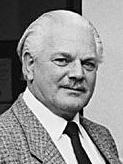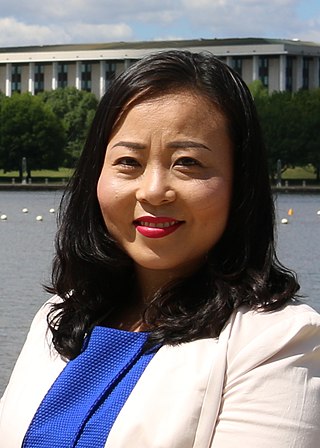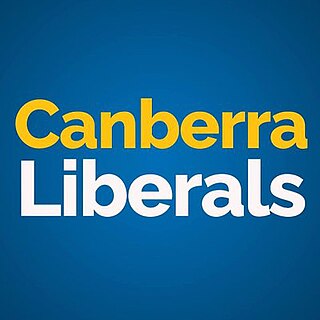Related Research Articles

The Australia Party was a minor centrist political party in Australia from 1969 to 1986. It was most influential in the late 1960s and early 1970s.

John Douglas Anthony was an Australian politician. He served as leader of the National Party of Australia from 1971 to 1984 and was the second and longest-serving deputy prime minister,holding the position under John Gorton (1971),William McMahon (1971–1972) and Malcolm Fraser (1975–1983).

Anne Katherine Carnell is an Australian businesswoman and former Liberal Party politician,who served as the third Chief Minister of the Australian Capital Territory (ACT) from 1995 to 2000.

Gary John Joseph Humphries is a Deputy President of the Administrative Appeals Tribunal. He was a member of the Australian Senate representing the Australian Capital Territory for the Liberal Party of Australia from 2003 to 2013. He was the Chief Minister of the Australian Capital Territory from 2000 to 2001;and was elected to the first parliament of the Australian Capital Territory,in 1989,later representing the Molonglo electorate until 2003.

Rosemary Follett is an Australian former politician who was the first Chief Minister of Australian Capital Territory,serving in 1989 and again between 1991 and 1995. She was the first woman to become head of government in an Australian state or territory.

The Sun Ripened Warm Tomato Party was an Australian joke political party that contested the first election for the Australian Capital Territory Legislative Assembly in 1989.
The Residents Rally (RR),officially known as the Residents Rally for Canberra Inc and also known simply as the Rally,was an Australian political party that was active during the early years of self-government in the Australian Capital Territory (ACT). It was led by human rights lawyer Bernard Collaery,who described it as a "community-based urban green party".

Trevor Thomas Kaine,was an Australian politician who served as Chief Minister of the Australian Capital Territory from 1989 to 1991. Kaine was elected into a multi-member single electorate in the unicameral Australian Capital Territory Legislative Assembly,from 1989 to 2001,initially as a member of the Liberal Party and later as an independent.

The 1989 Australian Capital Territory election was held on 4 March 1989 to elect the 1st Australian Capital Territory Legislative Assembly. This was the first direct election by voters in the Australian Capital Territory (ACT) for their power legislative body.

Elections to the 1992 Australian Capital Territory Legislative Assembly was held on Saturday,15 February,alongside a referendum on an electoral system for future elections. The incumbent Labor Party,led by Rosemary Follett,was challenged by the Liberal Party,led by Trevor Kaine. Candidates were elected to fill seats using the modified d'Hondt electoral system for a multi-member single constituency. The result was another hung parliament. However,Labor,with the largest representation in the 17-member unicameral Assembly,formed Government with the support of Michael Moore and Helen Szuty. Follett was elected Chief Minister at the first sitting of the second Assembly on 27 March 1992.

The Brindabella electorate is one of the five electorates for the unicameral 25-member Australian Capital Territory Legislative Assembly. It elects five members,and is the largest of the electorates in geographic area.
The Australian Capital Territory House of Assembly was the main elected representative body of the Australian Capital Territory between 1975 and 1986,during which time preparation began for the granting of self-government to the Territory. The Assembly had a largely advisory role,with most of the power over the Territory being in the hands of the relevant federal minister.
Paul Russell Whalan is an Australian political lobbyist and former politician who was a member of the first Australian Capital Territory Legislative Assembly. He served as the leader of the ACT Labor Party in the mid-1980s and was the leader of the party's Right faction.

The Deputy Chief Minister of the Australian Capital Territory is the second-most senior officer in the government of the Australian Capital Territory. The position has been a ministerial portfolio since its establishment in 1989. Unlike in other states and territories,the deputy chief minister of the ACT is not nominally appointed by an administrator or vice-regal,but by the chief minister.
Peter Dalton Hughes is an Australian retired urologist and former politician who served as the leader of the ACT Liberal Party from 1974 until he left the party in 1977. He is currently the president of the Regional Medical Specialists Association (RMSA).
The ACT Labor Party,officially known as the Australian Labor Party (ACT Branch) and commonly referred to simply as ACT Labor,is the Australian Capital Territory branch of the Australian Labor Party (ALP). The branch is the current ruling party in the ACT and is led by Andrew Barr,who has concurrently served as chief minister since 2014. It is one of two major parties in the unicameral ACT Legislative Assembly,and is currently in a coalition with the ACT Greens.

Elizabeth Lee is an Australian politician. She has been a member of the Liberal Party and has served in the Australian Capital Territory Legislative Assembly since 2016,representing the electorate of Kurrajong. Before entering the ACT Legislative Assembly,Lee worked as a lawyer,before becoming a lecturer at the Australian National University and University of Canberra.

The Canberra Liberals,officially known as the Liberal Party of Australia,is the division of the Liberal Party of Australia in the Australian Capital Territory (ACT). The party has been in opposition in the ACT Legislative Assembly for much of its existence,but held power with the support of minor parties and independents between 1989 and 1991 and again between 1995 and 2001. It is currently the only state or territory division of either major party to be unrepresented in the Federal Parliament.
The Canberra Liberals,the division of the Liberal Party of Australia in the Australian Capital Territory (ACT),have held a number of leadership elections and deputy leadership elections. The most recent was in October 2024,with Leanne Castley currently serving as party leader.

The Alliance,sometimes known as the Liberal–Residents Rally Alliance,was a political alliance between the Liberal Party,Residents Rally and Independents Group in the Australian Capital Territory Legislative Assembly.
References
- ↑ Leedman, Jim (13 August 1968). "Party and seminar". The Canberra Times. p. 2. Retrieved 22 October 2024.
- ↑ "ADDRESS TO LIBERAL PARTY DINNER, CANBERRA" (PDF). PM Transcripts. 27 September 1979. Retrieved 22 October 2024.
- 1 2 "The Liberal candidates". The Canberra Times. 27 May 1982. p. 8. Retrieved 22 October 2024.
- ↑ "At the ACT Order of Australia Association's Australia Day breakfast". Issuu. Canberra CityNews. 31 January 2013. p. 14. Retrieved 22 October 2024.
- 1 2 3 4 "THE LIBERAL CANDIDATES". The Canberra Times. 14 September 1967. p. 27. Retrieved 22 October 2024.
- ↑ "LIBERAL PARTY". The Canberra Times. 21 March 1966. p. 12. Retrieved 22 October 2024.
- ↑ "Senate plan supported". The Canberra Times. 1 June 1967. p. 3. Retrieved 22 October 2024.
- 1 2 "Our History". Canberra Liberals. Archived from the original on 8 October 2024. Retrieved 22 October 2024.
- ↑ "The shining example". The Canberra Times. 14 July 1966. p. 2. Retrieved 22 October 2024.
- ↑ "Record poll field of 16 for council". The Canberra Times. 29 August 1967. p. 3. Retrieved 22 October 2024.
- ↑ "RECORD OF COUNCIL CITED". The Canberra Times. 12 September 1967. p. 7. Retrieved 22 October 2024.
- ↑ "Liberals accused of fence-sitting". The Canberra Times. 13 September 1967. p. 14. Retrieved 22 October 2024.
- ↑ "NEW ADVISORY COUNCIL". The Canberra Times. 18 September 1967. p. 2. Retrieved 22 October 2024.
- ↑ "Three try for Council poll". The Canberra Times. 12 August 1970. p. 10. Retrieved 22 October 2024.
- ↑ "Inquiry sought on health centres". The Canberra Times. 12 September 1974. p. 8. Retrieved 22 October 2024.
- ↑ "2004 Week 10 Hansard". ACT Legislative Assembly. 26 August 2004. Retrieved 22 October 2024.
In 1974 he was elected as a member of Jim Leedman's Liberal team to the newly-created ACT Assembly
- ↑ Wright, Bruce (31 October 1974). "Board posts". The Canberra Times. p. 3. Retrieved 22 October 2024.
- ↑ Wright, Bruce (1 November 1974). "Assembly rejects move on boards". The Canberra Times. p. 1. Retrieved 22 October 2024.
- ↑ "ACT Liberal leader quits party". news.google.com. The Age. 4 January 1977. p. 1. Retrieved 22 October 2024.
- ↑ Myerscough, Ian (4 January 1977). "Dr Hughes quits Liberals". The Canberra Times. p. 1. Retrieved 22 October 2024.
- ↑ Myerscough, Ian (5 January 1977). "Meeting soon on Liberal leadership". The Canberra Times. p. 9. Retrieved 22 October 2024.
- ↑ "LEEDMAN LEADS LIBERALS". The Canberra Times. 21 January 1977. p. 1. Retrieved 22 October 2024.
- 1 2 Warden, Ian (27 October 1985). "Denigrating burglars to compare them to husbands that rape". The Canberra Times. p. 2. Retrieved 22 October 2024.
- ↑ "Jolimont site plans 'soon'". The Canberra Times. 30 July 1980. p. 15. Retrieved 22 October 2024.
- ↑ "Leedman moves to try to end dispute". The Canberra Times. 17 August 1981. p. 3. Retrieved 22 October 2024.
- ↑ Longhurst, Franky (17 April 1982). "Precedence given to Liberal outsiders". The Canberra Times. p. 3. Retrieved 22 October 2024.
- ↑ "Labor Members change leader". The Canberra Times. 8 March 1983. p. 3. Retrieved 22 October 2024.
- ↑ "Democrats slated over self-rule". The Canberra Times. 17 June 1986. p. 3. Retrieved 22 October 2024.
- ↑ "Pro-casino supporters could run a ticket against the Liberals". The Canberra Times. 26 June 1988. p. 2. Retrieved 22 October 2024.
- ↑ Fraser, Andrew (11 December 1988). "Winnel placed tenth on ticket". The Canberra Times. p. 1. Retrieved 21 October 2024.
- 1 2 "Libs back Kaine, says Leedman". The Canberra Times. 3 June 1991. p. 2. Retrieved 21 October 2024.
- ↑ "Follett safe, says Lib chief". The Canberra Times. 13 June 1991. p. 1. Retrieved 21 October 2024.
- ↑ "Leedman finds more in Christianity". The Canberra Times. 5 September 1984. p. 24. Retrieved 22 October 2024.